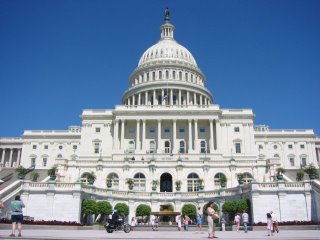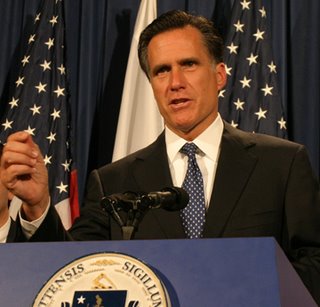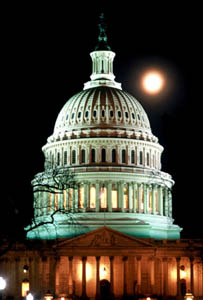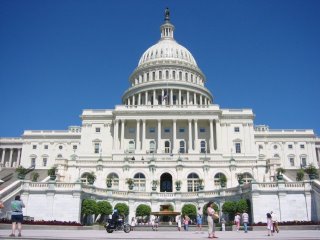
After a long night and the dust finally settled, Democrats took control of both the House and the Senate. The message from voters was loud and clear: "Throw the bums out." Here's my analysis of what happened during the election and why.
I. Voters Don't Like CrooksDemocrats had seized on corruption as an issue beginning in 2005. "Culture of corruption" became an all-purpose catchphrase for them to attack the Republican majority. Resignations of Tom DeLay, Duke Cunningham, Bob Ney, along with ongoing investigations into Jerry Lewis, and Curt Weldon gave credibility and political ammunition to the Democrats on the issue.
I noticed that in the past few months Democrats began focusing their attacks on Iraq and political/ideological synchronicity to the President, making corruption a secondary or tertiary issue. I was stunned when
CNN exit polls showed that voters ranked corruption as the number 1 issue of the election. This means that the Democrats had effectively nationalized the elections as a referendum on the status quo in Washington, and the "culture of corruption" line of attack was more effective than even they had probably anticipated. Take a look at this list of congressional casualties of the corruption issue:
Tom DeLay? Gone.
Bob Ney? Gone.
Duke Cunningham? Gone.
Katherine Harris? Gone.
Curt Weldon? Gone.
Richard Pombo? Gone.
Conrad Burns? Gone.
With the exceptions of Harris, Cunningham and Weldon, all of the others got tangled up in the Abramoff scandal. Cunningham is serving a prison sentence for taking bribes from defense contractor Mitchell Wade, and Katherine Harris is being scrutinized for her dealings with Wade. Weldon is the subject of an ongoing FBI investigation whether he used his office to influence or benefit contracts for his daughter. He was already down in the polls to Joe Sestak, but the fact that the investigation was revealed with less than a month to go before the election may have been the final straw for voters. I should note that the first three lawmakers on the list all resigned from Congress, two of which pleaded guilty to various offenses. The last four were voted out, and are under a cloud of suspicion but still innocent until proven guilty. While there were certainly other local and national political considerations that played a factor in the case of the lawmakers who were voted out, the corruption issue weighed on them heavily.
Now that the Democrats control both the House and the Senate, and have subpoena power, the public may be able to find out how deep the Jack Abramoff/Mitchell Wade rabbit holes go.
II. We Like You, We Really Do, But You're Fired.That was the message from voters to moderate Republicans across the country.
A few days ago, I noted that the Democrats were adopting the Republican strategy of consolidating their control of House seats in ideologically friendly geographic regions, particularly the Northeast, but also in areas of the Midwest, Pacific, and Rockies. The strategy worked with devastating results for Republicans.
The biggest scalp the Democrats claimed in this strategy was
Lincoln Chafee. It is absolutely astonishing to consider that a member of one of the most respected political families in Rhode Island, with a
63 percent approval rating and a long track record of disagreement with the Bush Administration and his Republican colleagues (Iraq, global warming, reproductive rights, etc.), was
defeated 53-47 by Democratic challenger
Sheldon Whitehouse. Whitehouse
successfully argued that while voters may like Chaffee personally, a vote for him was a vote to maintain GOP control of the Senate.
Chafee is not happy with the administration or the GOP-controlled Senate [see him sticking a finger in Bush's eye over the John Bolton re-nomination, effectively killing it in the GOP lame-duck session
Foreign Relations Committee], and is now thinking of
ditching the GOP, although I'm not sure what good that would do him at this point. Although not as bitter in tone as some of his immediate post-election defeat comments, check out his
op-ed in this Sunday's New York Times.
Rhode Islanders might have liked him, but the (R) in his political affiliation might as well have stood for Radioactive this year. I have a feeling that if Chafee had either defected to the Democrats or gone the Lieberman route and declared himself an independent in the Democratic caucus, he would still have his job.
Another House Republican who voted against the Iraq war,
Jim Leach of Iowa, got the boot from voters as well.
Mike DeWine was given the pink slip by his constituents, but in his case he was facing a politically hostile environment for Republicans in Ohio, in the aftermath of corruption scandals involving Bob Ney, Tom Noe, and outgoing governor Bob Taft.
Another big victim of the GOP moderates purge was
Nancy Johnson of Connecticut. Democrats and her challenger Chris Murphy threw the kitchen sink at her for her role in
crafting the legislation for the Medicare Part D bill. Because senior citizens tend to vote in higher numbers than other demographic groups, and because they were the ones most directly affected by the new Medicare plan, Johnson was toast,
losing 56-44. Chris Shays survived a nailbiter of a race, and Rob Simmons is
about 160 votes behind Democratic challenger Joe Courtney, and that race is undergoing a recount as of this writing.
III. It's the War, Stupid.To paraphrase
James Carville's famous catchphrase from the 1992 Clinton presidential campaign, Iraq was the issue this year. Unlike 2002 and 2004, this time around it was a radioactive albatross hanging from the neck of every single Republican who supported it, including one who didn't [Lincoln Chaffee].
Republicans committed several tactical blunders on how they treated the Iraq issue this election.
1) Victims of Their Own Marketing Campaign: They lived and died by the "stay the course" talking point ad nauseum for about two years. When they saw that the phrase was not a winning slogan in the final stretch and
tried to distance themselves from it, it became impossible for voters and the media not to see the ploy for the politically obvious and expedient flip-flop that it was. Republicans effectively tarred and feathered John Kerry in 2004 for his shifting positions on issues, and Democrats immediately pounced on this.
2) Off with Rumsfeld's Head: President Bush could have and should have replaced Donald Rumsfeld a long time ago. If he had done so, it would have neutralized him as a campaign issue, and it might have helped Republicans get away from the "stay the course" rhetoric which caught up with them in the end.
By waiting until after the elections to announce the change, with new Democratic majorities in the House and Senate, it gives the impression [wrongly] that he is capitulating to the Democratic position and offering them a symbolic sacrificial lamb.
Republicans are now criticizing the President for his decision to postpone replacing Rumsfeld until after the election. Newt Gingrich led the charge,
pointing the finger directly at the President:
“If the president had replaced Rumsfeld two weeks ago, the Republicans would still control the Senate and they would probably have 10 more House members. For the president to have suggested for the last two weeks that there would be no change and then change the day after the election is very disheartening.”
3) Cheney Off Message: During the final stretch of the election, Vice President Cheney continued to party like it was 2004, effectively undercutting the White House message of being flexible and willing to change course with
this little gift to the Democrats during an interview with ABC's George Stephanopoulos:
STEPHANOPOULOS: So will the vote on Tuesday have any effect on the president's Iraq policy?
CHENEY: I think it'll have some effect, perhaps, on the Congress, but the president's made clear what his objective is: It's a victory in Iraq and it's full speed ahead on that basis. And that's exactly what we're going to do.
STEPHANOPOULOS: So even those Republican candidates calling for a change of course are not going to get that on Wednesday.
CHENEY: No. You can't make policy, national security policy on the basis of that.
IV. The Social Conservatives' Big LossesAs if Mark Foley wasn't a big enough problem for Republicans, along comes Ted Haggard one week before the election and turns the evangelical world upside down after
allegations he used meth obtained from a male prostitute he was involved with for three years.
The Democrats had painted a bulls eye on
Rick Santorum's back since 2004, and they scored a direct hit on him on election night. He was the biggest scalp claimed by the Democrats on Election Day, the number 3 Republican in the Senate. Rumors are that he has presidential ambitions, and I don't think we've seen the last of Rick Santorum on the national stage. I heard someone say to expect a "Draft Santorum" movement among conservatives for 2008.
Several ballot initiatives to ban gay marriage and/or civil unions passed, although it narrowly lost in Arizona. However, the
Milwaukee Journal-Sentinel reported that although the gay marriage ban initiative on the Wisconsin ballot passed, it had the secondary effect of firing up liberal voters, some of whom voted for the ban, who got Democratic governor Jim Doyle re-elected, while giving Democrats the majority in the state Senate and made gains in the state Assembly.
More significant to religious and social conservatives is that Missouri passed its stem cell amendment 51-49 and the South Dakota abortion ban, intended as a direct challenge to Roe v. Wade, failed decisively when presented to the voters, 56-44.
V. The End of the Gang of 14Also worth noting is that two members of the bipartisan
"Gang of 14" in the U.S. Senate lost their re-election campaigns this year: Chafee and DeWine. Four other members of the group [
Joe Lieberman,
Robert Byrd,
Ben Nelson, and
Olympia Snowe] were re-elected.
The gang's influence as a shadow judiciary committee is dead for two reasons. First, their memorandum of understanding stipulated that it only applied to the 109th Congress, which is about to end in 2 months. Second, the need for the committee as a moderating influence in preserving the filibuster is no longer necessary, given that Democrats will now control the U.S. Senate and only need to hold their majority together to deep-six any judicial nomination they don't like.
VI. Democrats Pitch a Shut-OutThe Democrats were able to shape the dynamics of the race, forcing the GOP to play defense across the map and limit the number of vulnerable Democratic incumbents. Incredibly, not a single Democratic incumbent in any of the House, Senate, or Governor's races lost. I'm still researching to confirm this, but I think this is the first election where a party did not lose any incumbents.
VII. Republicans (Inadvertently) Do the Democrats' BiddingSome examples where immediate partisan political benefit (real or perceived) for the Republicans trumped long and short-term strategic thinking.
1) The Connecticut Senate Race: There was never any doubt that a Democrat was going to take this seat, whether it was
Ned Lamont or
Joe Lieberman. After losing the Democratic nomination, Republicans sent money and operatives to work on Lieberman's independent campaign. Exit polls show that Lieberman lost the majority of Democratic voters (again), but won on the backs of Republican and independent voters.
The problem here is that while Republicans would obviously prefer to have a senator like Lieberman than Lamont (particularly on the Iraq issue) the resources and millions of dollars in contributions that went to Lieberman could and given the benefit of hindsight probably should have been put to better use by contributions to Republican candidates or parties in tighter Senate races like Montana, Missouri, or Virginia, where the margin of victory for the Democratic candidates was 2 percentage points or less.
While Lieberman might have been tempted to defect if the Democrats had remained in the minority, there is no way he would do that now that they control the Senate. Adding insult to injury,
Lieberman recently re-declared his allegiance to the Democratic party, with a D in his title instead of the I that got him re-elected.
Bottom line: this time it was the Republicans who got shafted by what some of his critics within the Democratic party were pointing out this election year - his tendency for wanting to have things both ways. Unless he returns a lot of favors to his GOP supporters in the years ahead, he shouldn't expect to call them for help if he runs again in 2012. Regardless of which party he pledges loyalty to, Lieberman will have an enormous amount of influence as the Chairman of the Homeland Security Committee and as the potential swing vote that could mean the difference in a one vote majority or minority for a nomination, spending bill, or legislation.
UPDATE: Looks like I spoke too soon.
Lieberman made not-so-subtle comments hinting he might caucus with the GOP this past weekend on
Meet the Press:
MR. RUSSERT: If in fact they ask for discipline in the Democratic caucus, and you start to feel uncomfortable with it, would you consider crossing across the—going across the aisle, and joining the Republicans, if they gave you the same chairmanship that you had, and respected your seniority?
SEN. LIEBERMAN: Yeah. Well, that’s a hypothetical, which I’m, I’m not going to deal with here. I’m going to be an optimist, and take some encouragement from the fact that this was an election in which, in the House and Senate, Democrats came to the majority of both chambers by electing moderates mostly. This was an election that might be called the return of the center of American politics. And I think that my colleagues and leaders in the Democratic caucus get that. The fact is that this was not a major realignment election in my opinion. This was the voters in Connecticut and elsewhere saying, “We, we, we’re, we, we’re disappointed with the Republicans. We want to give the Democrats a chance.” But I believe that the American people are considering both major political parties to be in a kind of probation, because they’re, they’re understandably angry that Washington is dominated too much by partisan political games, and not enough by problem solving and patriotism, which means put the country and your state first.
MR. RUSSERT: Jim Jeffords of Vermont crossed over and joined the Democrats.
SEN. LIEBERMAN: Yeah.
MR. RUSSERT: And they gave—they gave him his committee chairmanship.
SEN. LIEBERMAN: Yeah.
MR. RUSSERT: You’re, you’re not ruling that out at some future time?
SEN. LIEBERMAN: I’m not ruling it out, but I hope I don’t get to that point. And, and I must say, and with all respect to the Republicans who supported me in Connecticut, nobody ever said, “We’re doing this because we, we want you to switch over. We want you to do what we think—what you think is right, and good for our state and country,” and I appreciate that.
If Lieberman does cross over to the GOP full-time during the next six years, Democrats should give the Ned Lamont campaign and the bloggers who supported it a great big "I told you so" award.
2) John Kerry's Botched Joke: It happened during the final stretch of the campaign, and Republicans decided to warm up the Anti-Kerry Machine that beat up on him to great effect and success in 2004, with President Bush and Vice President Cheney again leading the charge. It sucked the media oxygen for a good 2-3 days, and fanned the partisan flames for conservative bloggers and talk radio hosts. My guess would be that it was meant to energize the base by giving them a figure or issue to rally around and focus their energies on.
The problem is that Kerry, like the Saddam Hussein verdict, forced the Republicans to talk about Iraq and reminded voters of the messy situation in that country. While neither of the two events was beneficial to the Democrats, there was little or no upside for the Republicans either given that Iraq was an albatross hanging around the GOP's collective neck.
The only downside to this for the Democrats was to John Kerry, who was effectively neutralized as a surrogate during the final stretch of the campaign and probably deep-sixed any chances of getting the Democratic nomination in 2008 once and for all.
3) President Bush on the Campaign Trail: The ultimate anecdote of how much of a political liability the president has become to Republicans was his visit to Florida to stump for Republican candidate Charlie Crist, who snubbed him and went to campaign elsewhere in the state, essentially skipping his own event with the president.
During the final stretch of the campaign, President Bush visited states he won in 2004 to help shore up support for Republican candidates. The itinerary included stops in Missouri and Montana on behalf of Jim Talent and Conrad Burns, both of whom were locked in tight Senate races. The presidential visits may have done the opposite of the intended effect, by firing up Democrats and others voting against the incumbents, and possibly pushing undecided voters into taking a decision against Burns and Talent. We may never know.
UPDATE: I stand corrected. See this recent column by the National Journal's Chuck Todd:
The Bush factor
There's plenty of evidence to suggest that President Bush may have been the deciding factor that killed the GOP's momentum in some key Senate races over the last week. One Republican consultant is convinced that Bush's last-minute visit to Missouri on behalf of ousted GOP Sen. Jim Talent did the incumbent in. According to the network exit polls, Democrat Claire McCaskill crushed Talent among those late-breaking voters who decided in the final three days (a full 11 percent of the electorate). Bush also made a last-minute trip to Montana, where anecdotal evidence indicates the president's rally for Republican Conrad Burns stopped the incumbent's momentum in Billings.
Finally, for the record I'd like to re-visit my pre-election predictions. In the House, I predicted a 15-25 seat gain for the Democrats. The number stands at 29 right now according to CNN, but could go higher once the official counts [and in some cases, recounts] in 9 unsettled House races are finished. I was conservative in my estimates, figuring the Democrats would get a narrow majority. Depending on how the outcomes in those 9 undecided House races play out, Democrats could have a 30-38 seat majority. [UPDATE: Again, this is why I'm not a mathematician. The Democratic majority currently stands at 11 according to CNN's most recent calculations, excluding the as-of-yet undecided races.]
In the Senate, I correctly predicted the composition of the Senate (49 Democrats, 49 Republicans, 2 Independents, giving the Democrats an overall 51-49 majority), but because of a typo in the Missouri Senate race projection (I mistakenly typed Talent would win when I meant to type McCaskill), that threw off my math when calculating the Democrats' gains in the Senate. This is why I'm not a mathematician.
Now, on to 2008...










